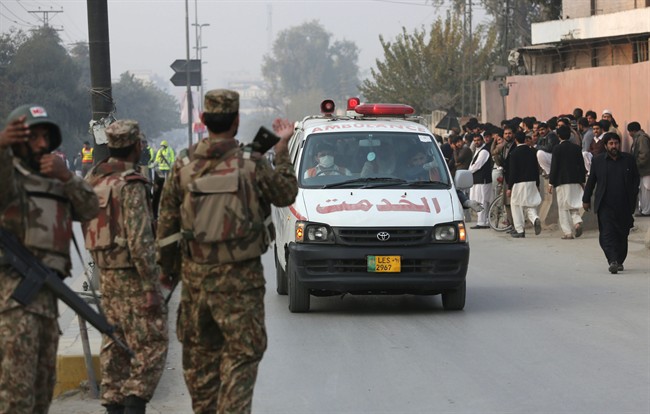Militants from the Tehreek-e-Taliban (TTP) have taken responsibility for the horrific attack at a school is Peshawar, Pakistan, where 141 people were killed, most of them children.

CNN’s national security analyst Peter Bergen called the act “Pakistan’s 9/11” and the Taliban in Afghanistan has come out on social media condemning the attack as un-Islamic.
Is the TTP any different than its Afghani counterparts? Thomas Johnson, a professor at the Naval Postgraduate School and Taliban scholar spoke to Global News and explained the history of the different Taliban sects and their relationship to the Pakistani government.
At one time, the Afghan and Pakistani Taliban were related groups, says Johnson. The TTP arose out of the Afghani Taliban around seven to 10 years ago. “Initially they were supporting the Afghan Taliban in the Afghan Taliban’s goal of removing foreigners from the country, especially the United States and NATO,” he says. But since that time — and it’s not clear when this happened — they branched off to support their own goals.
READ MORE: US, NATO mark end to Afghan combat mission
“Much of this has been to attack Islamabad,” says Johnson. “Even though Islamabad initially helped to fund these organizations.” He says there are a variety of terrorist organizations that operate on Pakistani soil, some of which are supported by the government. But in the last four to five years, the TTP has turned against Pakistan and waged a number of domestic terror events, he explains. The issue of whether or not they are still being funded by the government is debatable, says Johnson.
“With Tuesday’s attack, it is abundantly clear to all Pakistanis that their main enemy is the internal enemy — the Pakistani Taliban,” writes Bergen. He says that in 2012, the then army chief general of Pakistan, Ashfaq Parvez Kayani gave a speech indicating his intent to focus on the threats caused by the TTP.
READ MORE: Major militant attacks in Pakistan in recent years
In June, Pakistan launched an offensive against Taliban strongholds near the Afghan border, in North Waziristan. This operation started days after militants attacked an airport in the port city of Karachi, which killed 26 people and 10 attackers.
Bergen says the Pakistani military has claimed to have killed more than 1,000 militants in the past six months, including a key leader in al Qaeda, Adnan Shukrijumah. Indeed, Johnson says the TTP has a more international agenda than the Afghan Taliban, and is more associated with other terrorist groups such as al Qaeda.
“The Afghan Taliban has never attacked a Western target,” he says. They’re more focused on gaining control of their own country, whereas the TTP was behind the Times Square Bombing plot in 2010. Analysts have questioned what sort of communications the two groups still have, says Johnson. Reuters calls them separate, but allied groups — both aiming to overthrow their own governments and establish an Islamic state.
But Tuesday, an Afghan Taliban spokesperson spoke out against the TTP, according to Reuters.
“The intentional killing of innocent people, children and women are against the basics of Islam and this criteria has to be considered by every Islamic party and government,” said Zabihullah Mujahid in a statement.
–With files from The Associated Press.




Comments